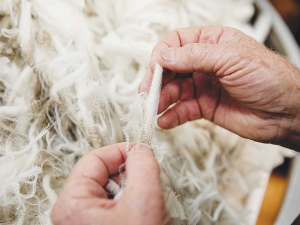New industry body aims to unite and rebuild strong wool industry
A new levying body, currently with the working title of NZWool, has been proposed to secure the future of New Zealand's strong wool sector.
 Domestic utilisation of wool is set to double following an edict that government agencies should use wool fibre products in the construction of new and refurbished buildings.
Domestic utilisation of wool is set to double following an edict that government agencies should use wool fibre products in the construction of new and refurbished buildings.
The annual domestic utilisation of wool will double to 30,000 tonnes because of the edict that government agencies should use woollen fibre products in the construction of new and refurbished buildings.
That's the view of Andy Caughey, chief executive of Wool Impact, a partly government-funded advocacy group that says the decision aligns with what is happening overseas and is seen as the new way of driving demand for strong wool.
The move is part of the coalition agreement between National and NZ First. Under the new edict, from 1 July government agencies will be directed to use woollen fibres in the construction and refurbishment of government buildings, where practical and appropriate.
A key driver and advocate of the move is Associate Minister of Agriculture Mark Patterson who says NZ First has been campaigning on this initiative for over a decade. He says way back he brought such a policy to a party convention.
He says the move is not a mandate, but government agencies are expected to commission wool fibre where practical and appropriate.
"If they don't, they have to report back as to why they didn't, so we are putting as much pressure on them as we can. This is about walking the talk and will hopefully inspire the private sector to follow suit," he says.
Patterson says probably more importantly this is a market signal to show the private sector that putting wool into homes is a good thing and hopefully they will follow the example set by government.
He says for too long wool has been left languishing in neutral while the producers of synthetic fibres have invested heavily in innovation and promotion.
Patterson says wool has been synonymous with NZ since the early settlers brought sheep here 200 years ago. And he says it remains the world's third largest wool producer after China and Australia, accounting for about 9% of total world wool production.
"Supporting the NZ wool industry is a key part of the positive steps the Government is taking to add value to the economy," he says.
Patterson says already he's had lots of positive feedback - not only from farmers but also the public who are passionate about wool.
Fonterra’s impending exit from the Australian dairy industry is a major event but the story doesn’t change too much for farmers.
Expect greater collaboration between Massey University’s school of Agriculture and Environment and Ireland’s leading agriculture university, the University College of Dublin (UCD), in the future.
A partnership between Torere Macadamias Ltd and the Riddet Institute aims to unlock value from macadamia nuts while growing the next generation of Māori agribusiness researchers.
A new partnership between Dairy Women’s Network (DWN) and NZAgbiz aims to make evidence-based calf rearing practices accessible to all farm teams.
Despite some trying circumstances recently, the cherry season looks set to emerge on top of things.
Changed logos on shirts otherwise it will be business as usual when Fonterra’s consumer and related businesses are expected to change hands next month.

OPINION: Here w go: the election date is set for November 7 and the politicians are out of the gate…
OPINION: ECan data was released a few days ago showing Canterbury farmers have made “giant strides on environmental performance”.